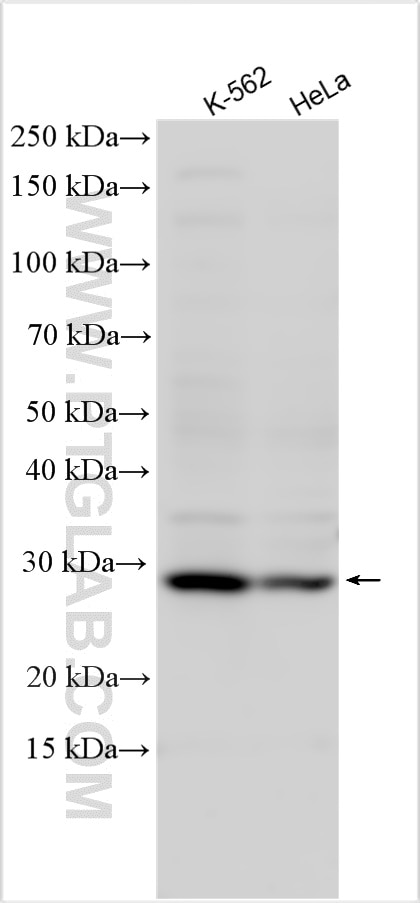Validation Data Gallery
Tested Applications
| Positive WB detected in | K-562 cells, HeLa cells |
Recommended dilution
| Application | Dilution |
|---|---|
| Western Blot (WB) | WB : 1:500-1:1000 |
| It is recommended that this reagent should be titrated in each testing system to obtain optimal results. | |
| Sample-dependent, Check data in validation data gallery. | |
Published Applications
| WB | See 1 publications below |
Product Information
13406-1-AP targets ATG10 in WB, ELISA applications and shows reactivity with human samples.
| Tested Reactivity | human |
| Cited Reactivity | human |
| Host / Isotype | Rabbit / IgG |
| Class | Polyclonal |
| Type | Antibody |
| Immunogen |
CatNo: Ag4052 Product name: Recombinant human ATG10 protein Source: e coli.-derived, PGEX-4T Tag: GST Domain: 1-220 aa of BC029268 Sequence: MEEDEFIGEKTFQRYCAEFIKHSQQIGDSWEWRPSKDCSDGYMCKIHFQIKNGSVMSHLGASTHGQTCLPMEEAFELPLDDCEVIETAAASEVIKYEYHVLYSCSYQVPVLYFRASFLDGRPLTLKDIWEGVHECYKMRLLQGPWDTITQQEHPILGQPFFVLHPCKTNEFMTPVLKNSQKINKNVNYITSWLSIVGPVVGLNLPLSYAKATSQDERNVP 相同性解析による交差性が予測される生物種 |
| Full Name | ATG10 autophagy related 10 homolog (S. cerevisiae) |
| Calculated molecular weight | 220 aa, 25 kDa |
| Observed molecular weight | 25-30 kDa |
| GenBank accession number | BC029268 |
| Gene Symbol | ATG10 |
| Gene ID (NCBI) | 83734 |
| RRID | AB_3669161 |
| Conjugate | Unconjugated |
| Form | |
| Form | Liquid |
| Purification Method | Antigen affinity purification |
| UNIPROT ID | Q9H0Y0 |
| Storage Buffer | PBS with 0.02% sodium azide and 50% glycerol{{ptg:BufferTemp}}7.3 |
| Storage Conditions | Store at -20°C. Stable for one year after shipment. Aliquoting is unnecessary for -20oC storage. |
Background Information
ATG10, also named as APG10L, is an E2-like enzyme involved in autophagy. It catalyzes the conjugation reaction between Atg12 and Atg5. ATG10 plays a role in adenovirus-mediated cell lysis.
Protocols
| Product Specific Protocols | |
|---|---|
| WB protocol for ATG10 antibody 13406-1-AP | Download protocol |
| Standard Protocols | |
|---|---|
| Click here to view our Standard Protocols |

